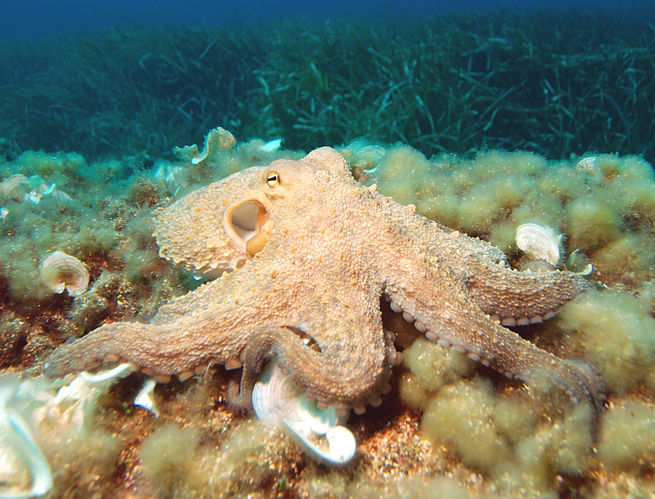-
Octopus
The octopus is a soft-bodied, eight-limbed mollusc of the order Octopoda. Around 300 species are recognised, and the order is grouped within the class Cephalopoda with squids, cuttlefish, and nautiloids. Like other cephalopods, the octopus is bilaterally symmetric with two eyes and a beak, with its mouth at the center point of the eight limbs (traditionally called “arms”, sometimes mistakenly called “tentacles”). The soft body can rapidly alter its shape, enabling octopuses to squeeze through small gaps. They trail their eight appendages behind them as they swim. The siphon is used both for respiration and for locomotion, by expelling a jet of water. Octopuses have a complex nervous system and excellent sight, and are among the most intelligent and behaviourally diverse of all invertebrates.
Octopuses inhabit various regions of the ocean, including coral reefs, pelagic waters, and the seabed; some live in the intertidal zone and others at abyssal depths. Most species grow fast, mature early and are short-lived. During breeding, the male uses a specially adapted arm to deliver a bundle of sperm directly into the female’s mantle cavity, after which he becomes senescent and dies. The female deposits fertilised eggs in a den and cares for them until they hatch, after which she also dies. Strategies to defend themselves against predators include the expulsion of ink, the use of camouflage and threat displays, their abilities to jet quickly through the water and hide, and even through deceit. All octopuses are venomous, but only the blue-ringed octopuses are known to be deadly to humans.
Octopuses appear in mythology as sea monsters like the Kraken of Norway and the Akkorokamui of the Ainu, and probably the Gorgon of ancient Greece. A battle with an octopus appears in Victor Hugo’s book Toilers of the Sea, inspiring other works such as Ian Fleming’s Octopussy. Octopuses appear in Japanese erotic art, shunga. They are eaten and considered a delicacy by humans in many parts of the world, especially the Mediterranean and the Asian seas.
-
Squid
Squid are cephalopods of the two orders Myopsida and Oegopsida, which were formerly regarded as two suborders of the order Teuthida, however recent research shows Teuthida to be paraphyletic. The two current orders comprise around 304 species. Like all other cephalopods, squid have a distinct head, bilateral symmetry, a mantle, and arms. Squid, like cuttlefish, have eight arms arranged in pairs and two, usually longer, tentacles.
-
Octopus (noun)
Any of several marine molluscs/mollusks, of the family Octopodidae, having no internal or external protective shell or bone (unlike the nautilus, squid or cuttlefish) and eight arms each covered with suckers.
-
Octopus (noun)
The flesh of these marine molluscs eaten as food.
-
Octopus (noun)
An organization that has many powerful branches controlled from the centre.
-
Squid (noun)
Any of several carnivorous marine cephalopod mollusks, of the order Teuthida, having a mantle, eight arms, and a pair of tentacles
-
Squid (noun)
A fishhook with a piece of bright lead, bone, or other substance fastened on its shank to imitate a squid.
-
Squid (noun)
A sailor in the Navy.
-
Squid (noun)
A quid; one pound sterling.
“Can you lend me five squid? I feel like a bacon sarnie.”
-
Squid (noun)
A motorcyclist characterized by lack of riding gear, reckless/careless/unsafe riding, especially of sport bikers.
-
Squid (verb)
To cause squidding. An improper, partial, parachute inflation, that results in the sides of the parachute folding in on the center, and pulsating back and forth.

